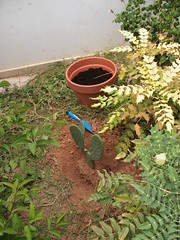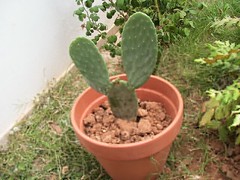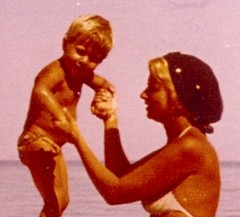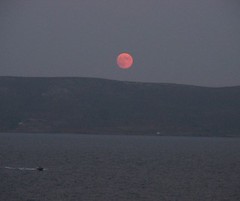Prickly Pears, by Joan PetersThe
dreaded month of August brewed some bad news for our own cute friend Πολυχρόνης (come on,
you remember him…). The land in which he was placed to lay roots and grow big and strong turned out to be inappropriate, and it became obvious that a slight change of location, angle and perspective was required to give him the chance of becoming everything we had hoped for.
So fate had it that on this particular, experimentally experimental first weekend of September, a month full of promise, the future of Polychronis came into my hands, since I was the one geographically closest to him. With religious devotion and utmost concentration, I set out to perform and document the delicate operation.
From the start I knew that I was not up to the task.
But I was lucky (oops, almost wrote licky) to have had some unexpectedly expected dear assistance, a poetic helping hand, (upper, lower, it doesn’t matter, one can see from miles that it’s the important one), that first allowed me to get rid of some of my tension, anxiety and stress, and then accompanied me all the way throughout the following adventure.
So, my internal turmoil taken care of, the two of us were able to proceed with…
Step 1: Research.
In the picture we see our friend Poly, in the state he was in until a few hours ago. Healthy, but unable to live there any longer, as was dictated by one of the (world’s) powers that be. We had to find the best way to move him out of there, including his kids and as big a part of his utterly important root system, and relocate him into safety.
Step 2: Dig-out
After identifying and obtaining the perfect pot he would be able to happily live and prosper in, a trench was dug all around him. This was the hardest part of the operation. Ideally, our dear friend would be removed from his current location, and continue experiencing his happy life at a new, different spot, oblivious to the changes that had taken place. He would feel all of his vital organs (ribs, sternum, whatever a cactus such as Poly holds inside his wide, flat body) intact, and, in the process, spill as little Tequila (as someone I know would say) or whatever other juices circulate around there, as possible.
Step 3: Transfer
A few moments of agony later, Poly was in his new (mobile) home. We were moved, concerned about his future, but certain that he would be ok. He always is… we agreed on that.
We took a moment to breath in and out, and to pull out some of the small, almost invisible pricks from each other’s fingertips. It’s a tricky job, especially if done so far up close (or at such a close distance).
Step 4: King!
The ideal location for him had already been established, there was no debating about it. He now stood at almost the opposite side of the garden, on his throne, in his shiny new pot, happy and strong.
We took care of his few scars, carefully covered his belly with some rich, healthy earth, watered him, kept him company for a few seconds, said goodbye and didn’t, and went on with our zillions of different affairs.
He’ll be ok. And we’ll be sure to keep you updated about his future developments, kids, grandchildren, the lot.



















